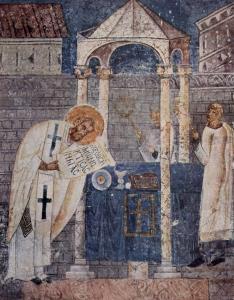
Having been baptized, and so put on Christ, we have been made free in Christ. We should not let ourselves become trapped by, and follow, useless ideologies, systematic determinisms, which limit us and prevent us from fully following Christ:
See to it that no one makes a prey of you by philosophy and empty deceit, according to human tradition, according to the elemental spirits of the universe, and not according to Christ. For in him the whole fulness of deity dwells bodily, and you have come to fulness of life in him, who is the head of all rule and authority. In him also you were circumcised with a circumcision made without hands, by putting off the body of flesh in the circumcision of Christ; and you were buried with him in baptism, in which you were also raised with him through faith in the working of God, who raised him from the dead (Col. 2:8-12 RSV).
Christ, fully human, is truly human, and we find ourselves fully and truly human in him. We can certainly learn from philosophy – good philosophy is the handmaid of theology, after all – but we must not listen to or agree with those modern ideologies which tell us we cannot truly follow Christ and his expectations. Varieties of capitalism and libertarianism and rugged individualism try to find excuses as to why we are not expected to care for our neighbor; indeed, they tell us it is impossible, and if we try, we only go against what is “natural.” The nature they know is not the true nature, but a perverted, fallen, ideological construct, one which reads fallen egotism into nature itself. We must not fall prey to them. We must not let them dictate to us what is or is not natural, what is or is not possible, because if we listen to them, we will end up believing the Christian faith itself is not possible, for its teachings run contrary to their ideological principles. Christ frees, and in him, what sin and the structures of sin suggest as not being possible, not only are possible, but become actualized and realized. As we unite with him, we find it is truly possible to transcend such ideologies suggest and to live in Christ, becoming Christ to a world which need his saving grace. In him, we can grow and be like him, growing in wisdom and grace (cf. Lk. 10:40; 52), so that whatever we find deficient in our nature (fallen or otherwise), we find more than fulfilled by deifying grace. Likewise, we can follow after Christ to the Temple, call upon God, and in doing so, begin to do God’s will, finding that when we do so, all the world itself is God’s house (cf. Lk. 10:46-50).
We must withdraw, therefore, from vain ideologies, with whatever philosophical backing they try to use when they tells us it is impossible to follow God and to do God’s will. We must withdraw from those who tell us to look after ourselves alone. We must withdraw from those who tell us to love money more than our neighbor. We must withdraw from those who tell us we can turn justice a thing of charity so as to make justice itself voluntary. We must withdraw from those who will add to the structures of sin by reinforcing the ego in various ways. We must likewise withdraw from our own egotism, overcoming all the temptations which come our way as a result of selfish self-interest. True withdrawal from the world, is not, therefore, about abandoning the world, or forming some small community in which we can feel smugly superior to the rest of the world, but by overcoming the ideologies of the world which lead us astray, so that we can then follow after Christ and do as Christ would have us do in the world. Thus, St. Basil tells us:
Withdrawing form the world, however, does not mean merely bodily absence, but implies a disengagement of spirit from sympathy with the body; a renunciation of city, home, personal possessions, love of friends, property, means of livelihood, business, social relations, and learning acquired by human teachings; also, a readiness to receive in one’s heart the impressions produced there by divine instruction. And this disposition follows the unlearning of worldly teachings which previously held possessions of the heart. [1]
It is the disposition of the heart which matters. We must truly allow ourselves to be incorporated into Christ, to take on the pathos of Christ for ourselves. St. Basil was led to the ascetic life, to be a monk, but he was led to also to do corporal works of mercy, recognizing the two go together. Being a monk was not about retreating from the world, ignoring one’s duty to one’s neighbor, but about purifying oneself, dying to the self, so that one overcomes all vain ideologies which promote the fallen self and its ways. Departure from the world is not about physical distancing from others, but about transcending the structures of sin in the world so that one can truly be in the world, like Christ, working with it, guiding it, directing it, helping it with grace. Denying the world must not be understood as a nihilistic rejection of the world, but rather, its opposite, and those who would misconstrue the monastic path as a way to reinforce deadly ideologies have not truly learned the lessons of the great monastic saints, but rather, have undermined them.
St. Basil points out, contrary to so many ideologies, that we are to join together with others, bringing about a union of love with them, and this is truly how we overcome the world and receive the promptings of the Spirit:
But, the gift of the Spirit beings about true love, joining together things separated by long distances and making known the beloved ones to each other not through physical characteristics but through the peculiar qualities of the soul. [2]
This is one of the reasons why, when various men and women entered into the ascetic life, they must not be seen as denying their connection with the rest of humanity. Rather, no matter where they find themselves, if they truly die to the self, their love would grow and they would find themselves joined with their neighbor, no matter how distant their neighbor is. Their withdrawal into a monastic community brought them closer, not further apart, from others; those who would encourage a withdrawal from others, ignoring one’s place in the world and the responsibility we have for our neighbor, therefore, represent the antithesis to the true monastic legacy. While St. Basil was not the founder of the monastic movement, he was one of its great shapers and thinkers; those who came after him, like St. Benedict, continued in Basil’s wisdom, and to properly understand them, one must understand Basil and his promotion of Christ-like work in the world. St. Basil lived the life which he preached; he gave to the poor and hungry, even as he warned the rich and powerful what would happen to them if they followed their own inordinate passions over the teachings of Christ. Even if we are not called to the monastic life, we are called to the withdrawal from the world which St. Basil represented, that is, to find a way to transcend the structures of sin and the ideologies they create so as to put on the heart of Christ. Then, we should live in and with that heart, filling the world with Christ’s grace. We should avoid all temptations, especially those given to us by ideologies, which would seek to turn us away from our work in the world, because in the end, if we follow those ideologies, far form making the world a better place, we will only make it worse, as we deny it the grace which it needs for its restoration.
[1] St. Basil the Great, Letters. Volume 1 (1-185). Trans. Agnes Clark Way (New York: Fathers of the Church, 1951), 6 [“Letter 2: Basil to Gregory”].
[2] St. Basil the Great, Letters. Volume 1 (1-185). Trans. Agnes Clark Way (New York: Fathers of the Church, 1951), 274 [Letter 133, To Peter, Bishop of Alexandria].
Stay in touch! Like A Little Bit of Nothing on Facebook.
If you liked what you read, please consider sharing it with your friends and family!













